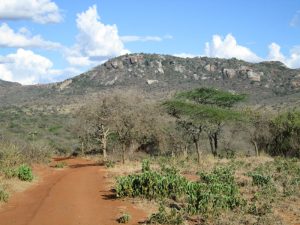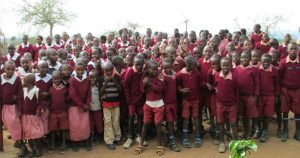Location
Orinie Sublocation, Orinie Location, Kajiado District, Rift Valley Province, Kenya
Community Description
The community of Orinie is located in the hills to the South East of Kajiado town, some 10 km of the rough road off of the Nairobi-Namanga Highway. Although the distance from Orinie to Kajiado is only 35 kilometers, the contrast between the district capital and the village is striking.
Nearly all of the 2,700 people who have settled in Orinie are Maasai. Families live in small clusters, building their homes from cow dung and thatch. Residents rely on biannual harvests of maize and beans to meet their nutritional needs.
As the Maasai are a pastoralist society most everyone keeps cows, goats, and sheep. Animals are brought out to graze during the day, but the scorching sun and semi-arid climate bring people farther and farther away from home in search of vegetation for the animals.
 There are two rainy seasons in Orinie, and the months between are difficult ones. Ask almost anyone who calls Orinie home and they will tell you that the biggest challenge the community faces is water.
There are two rainy seasons in Orinie, and the months between are difficult ones. Ask almost anyone who calls Orinie home and they will tell you that the biggest challenge the community faces is water.
Most women make a daily trek to and from the Ol Kejuado River to fill jerry cans with enough water to meet the daily needs of their families. Boreholes installed in the last decade have greatly improved the situation, but are prone to mechanical problems and take hours for some women to reach by foot.
The Orinie Primary School, where 290 boys and girls attend school each day, also struggles to provide adequate and clean water to students. The school currently buys water from the closest borehole, spending large sums of money each term, and pulling students from class each day to fetch water. When the borehole breaks, dirty water is carried from the river up to the school. As some children walk as far as 9 kilometers on their way to class, having access to safe drinking water is absolutely essential.
AIC Orinie Dispensary, a faith-based health clinic located within walking distance from the primary school, reports a high incidence of diarrheal disease among children. While health care workers emphasize the importance of regular hand washing and the use of safe drinking water, it is difficult to instill these values in youth who do not have access to water.
Alongside diarrheal diseases, many children suffer from malnutrition due in part to a diet consisting almost entirely of maize and beans. While people acknowledge the importance of vegetables there is no market in Orinie, and families find it difficult to prioritize using water to support a kitchen garden when it is such a scarce commodity.
 Project Description
Project Description
This project is to construct a rainwater catchment system at Orinie Primary School.
As the school is already equipped with a corrugated metal roof, and has managed to acquire water tanks from outside donations, the work of bringing safe water to Orinie’s students is already half done.
Rainwater that falls in the wet seasons (from November to December, and again from March to April) will be harvested through steel gutters and stored in four tanks (2 x 10,000 Liters and 2 x 5,000 Liters).
Water Charity funds will cover the purchase of gutters, pipes, and joints, as well as their transport from Kajiado town. Local craftsmen will install gutters and connect them to existing tanks.
Throughout the year, tanks will provide boys and girls with drinking water, water for washing hands, and for cooking. Additionally, students and teachers who board at the school will be able to use rainwater for bathing.
In September the school broke ground on a small garden, where teachers plan to plant kale, spinach, and tomatoes to supplement the diet of school children. With a rain catchment system, they will be able to proceed with planting, confident that there will be enough water to support the garden.
Project Impact
300 people will benefit from the project, including 208 upper primary students, 82 nursery school students, and 10 teachers employed by the school. Boys and girls who board at the school will especially be affected, as will those who live particularly far away from the school.
Peace Corps Volunteer Directing Project
Anna Hankins
Comments
In short, the rain catchment system will greatly improve the health of students at Orinie Primary School. It will enable them to learn and practice safe hand washing, to hydrate throughout the day, and also to add much-needed nutrients to their diet. What’s more, the quality of education will be elevated as students will no longer be pulled from their lessons to fetch water and the school budget will dedicate more funds to education.
Dollar Amount of Project
$555.00
Donations Collected to Date
$555.00
Dollar Amount Needed
$0.00 – This project has been fully funded, through the generosity of CannedWater4Kids.
![]() This project has been finished. To read about the conclusion of the project, CLICK HERE.
This project has been finished. To read about the conclusion of the project, CLICK HERE.